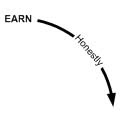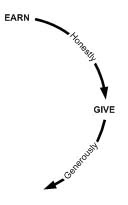The financial area of life is about how you relate to money. Most people in this world think that money is great and the more of it they can get, the better off they will be. King Solomon is a person who had a lot of money but had this to say about it.
“Those who love money will never have enough. How absurd to think that wealth brings true happiness!”
Ecclesiastes 5:10 (NLT)
Other people believe that “Money is the root of all evil.” And therefore, the less of it they have the better off they will be. What does the Bible say about money? Is it good or evil?
“For the love of money is at the root of all kinds of evil.”
1 Timothy 6:10 (NLT)
Money is not evil. Money is neutral. However, my attitude about money is usually not neutral, it can be evil. Knowing the truth about money is the key to being free. We will call that place “Financial Freedom.”
“And you will know the truth, and the truth will set you free.”
John 8:32 (NLT)
The first and most important truth about money is that it all belongs to God.
“‘The silver is mine, and the gold is mine,’ says the LORD Almighty.”
Haggai 2:8 (NLT)
God owns everything. You are not the true owner of anything. You are merely a manager over the things He allows you to possess.
“Now, a person who is put in charge as a manager must be faithful.”
1 Corinthians 4:2 (NLT)
There are really only four things you can do with money. You can:
1. Earn money
2. Give money
3. Spend money
4. Invest money
The key to enjoying money and experiencing financial freedom is to do each of these four things in a way that is faithful to God, who is the true owner. Financial freedom comes as a result of financial faithfulness.
Before there is any spending, giving or investing, you have to earn money.
Q1. Do you think it matters to God how you earn your money?
The Bible teaches that your ability to earn money is a gift from God.
“...Never think that it was your own strength and energy that made you wealthy. Always remember that it is the LORD your God who gives you power to become rich...”
Deuteronomy 8:17–18 (NLT)
The Bible teaches to earn money through hard work.
The Bible teaches to earn money through hard work.
“If you are too lazy to plow in the right season, you will have no food at the harvest.”
Proverbs 20:4 (NLT)
And finally, the Bible teaches that when you earn money, earn it honestly.
"Unless you are faithful in small matters, you won't be faithful in large ones. If you cheat even a little, you won't be honest with greater responsibilities.”
Luke 16:10 (NLT)
 Earn money without cheating, lying, or taking advantage of others. Earning money, even if you earn a lot of it, does not lead you to financial freedom. Freedom comes only when you earn it within the boundaries of financial faithfulness.
Earn money without cheating, lying, or taking advantage of others. Earning money, even if you earn a lot of it, does not lead you to financial freedom. Freedom comes only when you earn it within the boundaries of financial faithfulness. After you earn money honestly God challenges you to give generously.
“Honor the LORD from your wealth and from the first of all your produce; so your barns will be filled with plenty and your vats will overflow with new wine.”
Proverbs 3:9–10 (NASB)
Q2. Do you believe in giving? When? Do you give before or after you spend money on things you don't need?
 When you give generously, instead of running out of money, God multiplies your money.
When you give generously, instead of running out of money, God multiplies your money. “If you give, you will receive. Your gift will return to you in full measure, pressed down, shaken together to make room for more, and running over. Whatever measure you use in giving—large or small—it will be used to measure what is given back to you.”
Luke 6:38 (NLT)
When you earn honestly and give generously, financial faithfulness requires you to spend it wisely. The first priority is to spend it on your family needs.
“Who is a faithful, sensible servant, to whom the master can give the responsibility of managing his household and feeding his family?”
Matthew 24:45 (NLT)
Q3. How would you define the difference between a need and a want?
Q4. Have you ever spent money on things you didn't need before you paid for all the things you did need?
Q5. If you are in debt, can you trace it back to spending money on things you wanted but didn't need?
The Bible says that God will supply all your needs.
“And my God shall supply all your need according to His riches in glory by Christ Jesus." Philippians 4:19 (NKJ)
 When you earn money honestly then you can give it generously and spend it wisely. With the remainder, invest it carefully in order to bring an increase.
When you earn money honestly then you can give it generously and spend it wisely. With the remainder, invest it carefully in order to bring an increase.Investing God's money is another issue of faithfulness. The goal of investing money is to make the money grow. Spending money on something that goes down in value, like a car or a boat, is not investing. Hoarding money in a place where it does not grow is not investing either.
“Well, you should at least have put my money into the bank so I could have some interest.” Matthew 25:27 (NLT)
Investing is buying something today that can be sold for more money in the future. Financial freedom actually lies within the boundaries of these four principles.
Financial freedom actually lies within the boundaries of these four principles.  Though it may seem at times that freedom could come from breaking outside the boundaries defined by financial faithfulness, the truth is that only misery, slavery, and death wait for you on the outside.
Though it may seem at times that freedom could come from breaking outside the boundaries defined by financial faithfulness, the truth is that only misery, slavery, and death wait for you on the outside.
Investing is buying something today that can be sold for more money in the future.
 Financial freedom actually lies within the boundaries of these four principles.
Financial freedom actually lies within the boundaries of these four principles.  Though it may seem at times that freedom could come from breaking outside the boundaries defined by financial faithfulness, the truth is that only misery, slavery, and death wait for you on the outside.
Though it may seem at times that freedom could come from breaking outside the boundaries defined by financial faithfulness, the truth is that only misery, slavery, and death wait for you on the outside.“Trust in the LORD with all your heart; do not depend on your own understanding. Seek his will in all you do, and he will direct your paths.”
Proverbs 3:5–6 (NLT)
Take time to talk to God about your finances. Are you willing to do whatever He wants you to do with your finances? If you so, when will you take action?



No comments:
Post a Comment